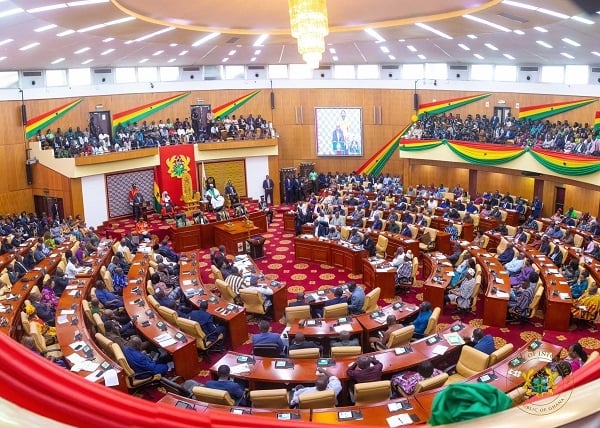The Parliament of Ghana has unanimously endorsed a crucial financial measure, the Expenditure in Advance of Appropriation, totaling GH¢68.1 billion (approximately USD $5.7 billion). This provisional budget, often referred to as a “mini-budget,” is designed to bridge the financial gap between the end of the 2024 fiscal year and the presentation of a full budget by the incoming administration in early 2025. It will cover essential government expenditures for the first quarter of 2025, from January to March, ensuring continuity in public services and the smooth operation of government machinery during this transitional period. The unanimous approval underscores the bipartisan recognition of the necessity of this measure to maintain stability and prevent disruptions in the delivery of vital services to the citizens of Ghana.
The GH¢68.1 billion allocation is strategically distributed across critical sectors to uphold essential government functions. A significant portion is earmarked for compensation of employees in the public sector, ensuring timely payment of salaries and benefits for civil servants, teachers, healthcare professionals, and other public sector workers. This will maintain the stability and morale of the public workforce, crucial for the continued delivery of public services. Another substantial allocation is dedicated to meeting statutory obligations, which include debt servicing, pension payments, and other legally mandated expenditures. This ensures that Ghana meets its financial commitments and maintains its creditworthiness, both domestically and internationally.
Furthermore, the mini-budget provides funding for the ongoing maintenance of existing infrastructure projects, preventing deterioration and ensuring the continued functionality of vital public assets such as roads, bridges, schools, and hospitals. This proactive approach safeguards public investments and minimizes the risk of more costly repairs in the future. In addition, social intervention programs, designed to support vulnerable populations and promote social welfare, will continue to receive funding under this provisional budget. This ensures the ongoing provision of essential services such as healthcare, education, and social safety nets, mitigating the potential impact of the transition period on the most vulnerable members of society.
The approval of the Expenditure in Advance of Appropriation adheres to the constitutional provisions of Ghana, designed specifically to manage financial transitions between administrations. These provisions mandate the allocation of funds to sustain government operations until a new budget is presented and approved. This ensures that there is no disruption in the delivery of essential services and allows the incoming government sufficient time to formulate and present its comprehensive budget for the remainder of the fiscal year. This process upholds the principles of fiscal responsibility and ensures the continuity of governance during periods of political transition.
The significance of this parliamentary consensus extends beyond the immediate provision of funds. It demonstrates a commitment to political stability and collaboration in upholding the national interest. The unified approach to this essential financial measure sends a positive signal to both domestic and international stakeholders, reinforcing confidence in Ghana’s democratic processes and commitment to fiscal prudence. This bipartisan cooperation is particularly important during transitional periods, demonstrating a shared responsibility for the smooth functioning of government and the well-being of the citizenry.
In essence, the parliamentary approval of the GH¢68.1 billion Expenditure in Advance of Appropriation is a crucial step in ensuring the seamless continuation of government operations during the transition period leading to the new administration’s assumption of office in 2025. It provides a financial bridge, ensuring the uninterrupted delivery of essential services, the maintenance of critical infrastructure, and the fulfillment of statutory obligations. The bipartisan support for this measure reflects a shared commitment to fiscal responsibility and the smooth functioning of Ghana’s democratic institutions, reinforcing stability and promoting public confidence in the government’s ability to navigate periods of political transition effectively.














